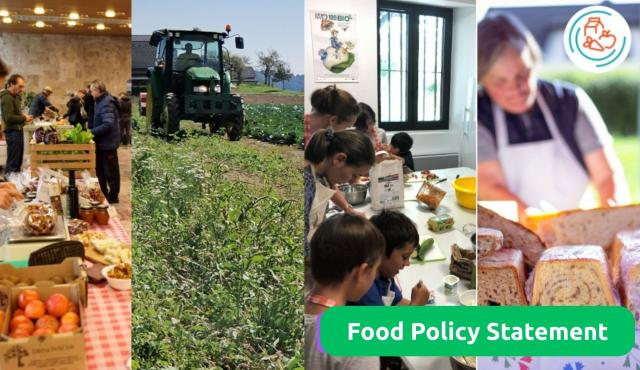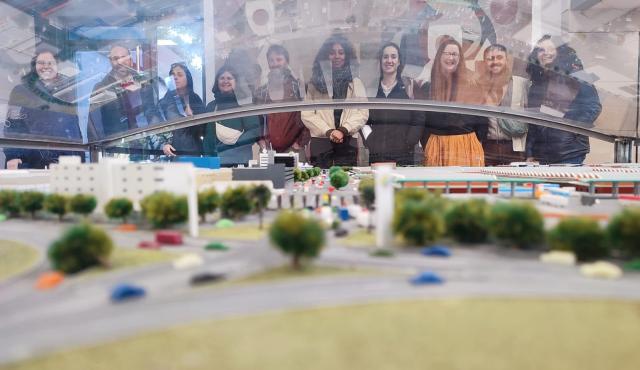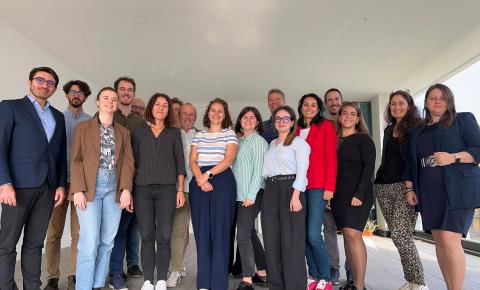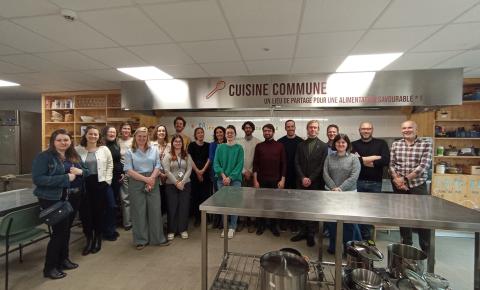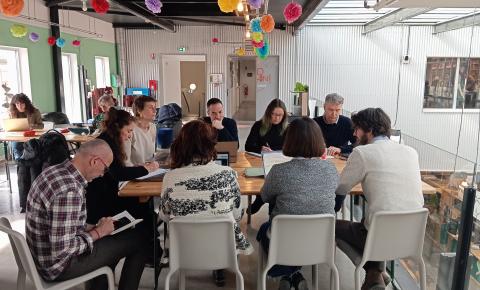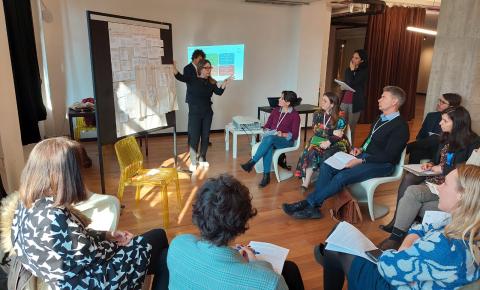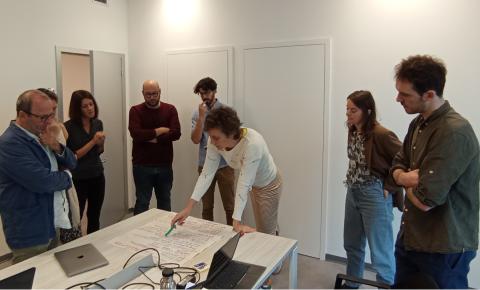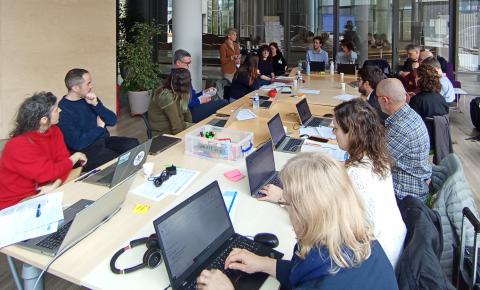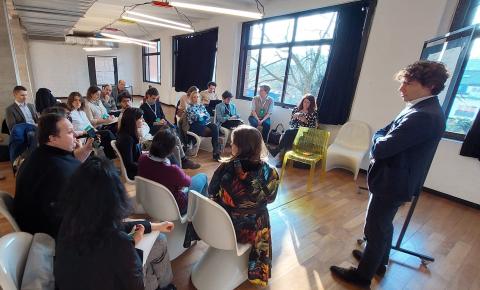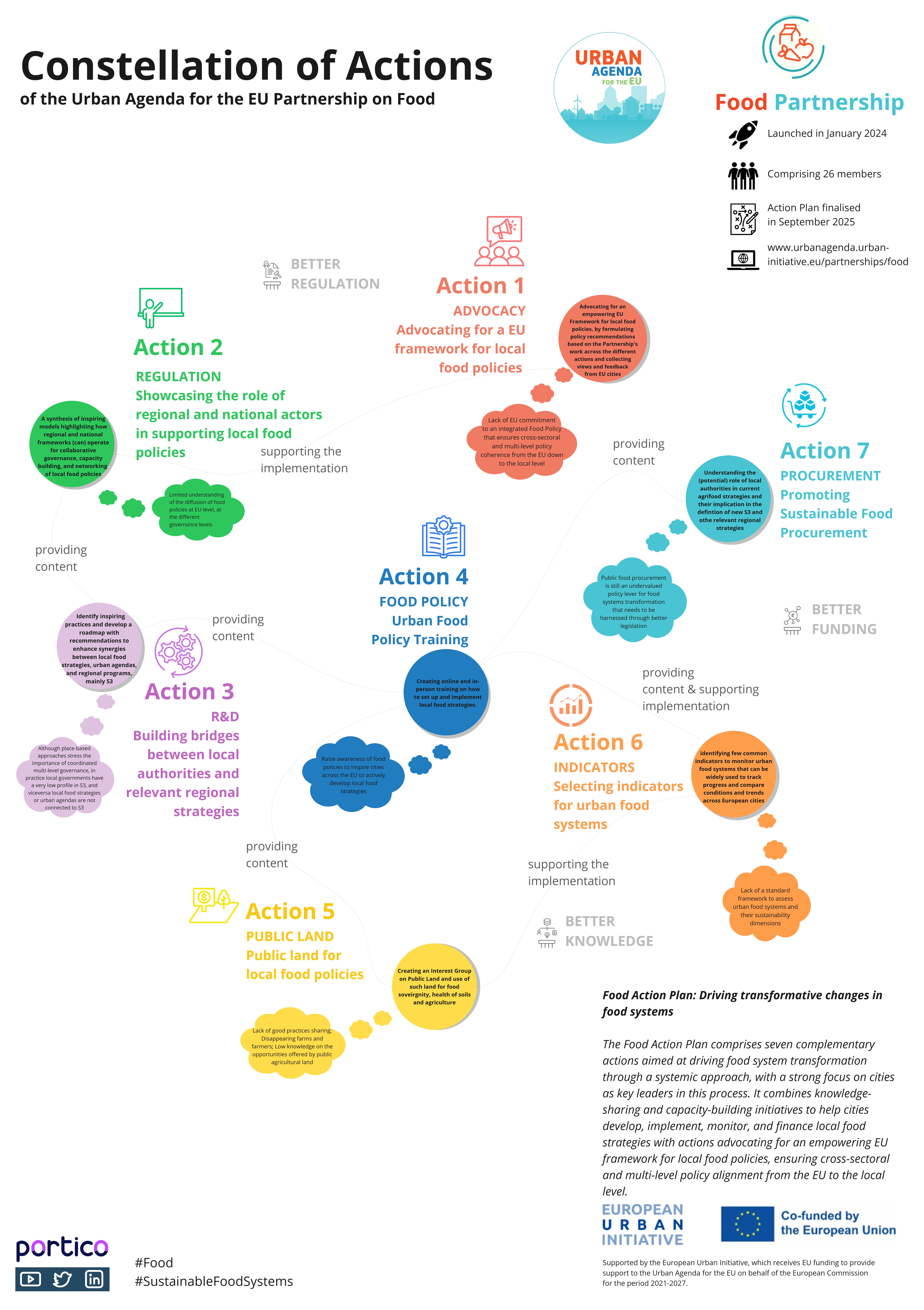News
About the Partnership
The Urban Agenda for the EU Partnership on Food was launched in January 2024 and gathers twenty-six relevant stakeholders from different sectors and levels of governance to build consensus around shared goals and priorities for sustainable food systems, and advocate for these at the national and EU levels.
The transformation of food systems requires a systemic approach, and the Food Thematic Partnership will prioritise the role of cities in leading this transformation by adopting innovative urban food policies.
The adoption of a multi-level governance, multi-sector, and multi-stakeholder approach, in line with the Urban Agenda for the EU framework, will serve as the cornerstone of the Partnership's overall strategy, enabling to find a holistic and inclusive response to the multifaceted challenges of the food system, relying on the quadruple helix as the main framework to build such strategy.
Thematic Focus
Through a collaborative brainstorming and narrowing-down process, the Partnership identified three overarching themes that represent the most relevant and high-priority topics for its members, while aligning with the Partnership’s expertise, resources, and institutional mandate: Innovative Funding, City-Region Framework, EU/National Regulation.
The Orientation Paper specifies the potential outputs and expected impacts of each thematic area, as well as the contributions of each theme to the three UAEU pillars (Better Funding, Better Knowledge, Better Regulation).
The actions outlined in the final Action Plan translate the vision, values, and objectives of the Partnership into concrete steps. They are closely aligned with the key thematic areas of focus presented in the Orientation Paper.
Specifically, the Food Action Plan consists of seven complementary actions designed to drive the transformation of food systems through a systemic approach, with a particular emphasis on cities as key leaders in this process. It combines knowledge-sharing and capacity-building initiatives to support cities in developing, implementing, monitoring, and financing local food strategies. The Action Plan also advocates for an empowering EU framework for local food policies, ensuring cross-sectoral and multi-level policy alignment from the EU to the local level.
ADVOCACY - Advocating for a EU framework for local food policies
The action aims at formulating policy recommendations based on the Partnership's key results across the different actions and based on feedback from European cities on the EC Vision for Agriculture and Food. Recommendations will be included in a policy document (statement, brief) and disseminated, among others, through an exchange during a final event in Brussels reaching EU institutions and policy makers.
REGULATION - Showcasing the role of regional and national actors in supporting local food policies
The action aims to provide a synthesis of inspiring models highlighting how regional and national actors, initiatives, or institutional frameworks (can) operate for collaborative governance, capacity building, and networking of local food policies. Key insights will be integrated in the policy recommendations of action 1.
R&D - Building bridges and synergies between local authorities and relevant regional strategies
The action aims to assess the role of local authorities in current regional programs (i.e. agrifood RIS3, S3s), as well as their potential involvement in shaping new relevant funding opportunities. The goal is to identify inspiring practices and develop a protocol or roadmap with recommendations to enhance synergies between local food strategies, urban agendas, and regional programmes.
FOOD POLICY - Urban Food Policy Training
Starting from existing resources developed by the Food Trails Horizon 2020 project, the action will create an online and in-person training on how to set up and implement Local Food Policies for partner cities. The learning programme will also lead to the formulation of recommendations for local authorities to be shared at the EU level.
LAND USE - Public Land for Local Food Policies
The action will foresee the creation of an Interest Group on public land and use of such land for food sovereignty, health of soils and agriculture. It will develop knowledge sharing, advocacy and capacity building activities such as organising webinars for exchange of best-practices and policy briefs.
INDICATORS - Selecting indicators for urban food systems
The action aims to identify few common indicators to monitor urban food systems that can be widely used to track progress and compare conditions and trends across European cities. The goal is to discuss indicators with cities and EC stakeholders, and to propose one or a set of indicators on urban food systems to be introduced at the EU level- EUROSTAT.
PROCUREMENT - Promoting sustainable Public Food Procurement
The action seeks to clarify the Food Partnership's position on public food procurement, offering a position paper that includes key data, strong arguments, best practices, and recommendations. This will serve as a crucial resource for the Partnership’s advocacy efforts. Additionally, it will develop relevant materials to be used for Action n.4 by gathering approaches from various contexts and projects.
The action aims at formulating policy recommendations based on the Partnership's key results across the different actions and based on feedback from European cities on the EC Vision for Agriculture and Food. Recommendations will be included in a policy document (statement, brief) and disseminated, among others, through an exchange during a final event in Brussels reaching EU institutions and policy makers.
The action aims to provide a synthesis of inspiring models highlighting how regional and national actors, initiatives, or institutional frameworks (can) operate for collaborative governance, capacity building, and networking of local food policies. Key insights will be integrated in the policy recommendations of action 1.
The action aims to assess the role of local authorities in current regional programs (i.e. agrifood RIS3, S3s), as well as their potential involvement in shaping new relevant funding opportunities. The goal is to identify inspiring practices and develop a protocol or roadmap with recommendations to enhance synergies between local food strategies, urban agendas, and regional programmes.
Starting from existing resources developed by the Food Trails Horizon 2020 project, the action will create an online and in-person training on how to set up and implement Local Food Policies for partner cities. The learning programme will also lead to the formulation of recommendations for local authorities to be shared at the EU level.
The action will foresee the creation of an Interest Group on public land and use of such land for food sovereignty, health of soils and agriculture. It will develop knowledge sharing, advocacy and capacity building activities such as organising webinars for exchange of best-practices and policy briefs.
The action aims to identify few common indicators to monitor urban food systems that can be widely used to track progress and compare conditions and trends across European cities. The goal is to discuss indicators with cities and EC stakeholders, and to propose one or a set of indicators on urban food systems to be introduced at the EU level- EUROSTAT.
The action seeks to clarify the Food Partnership's position on public food procurement, offering a position paper that includes key data, strong arguments, best practices, and recommendations. This will serve as a crucial resource for the Partnership’s advocacy efforts. Additionally, it will develop relevant materials to be used for Action n.4 by gathering approaches from various contexts and projects.
You can also explore the embedded Miro board below to view the Food Action Plan at a glance.
Members
By clicking on the symbol , in the top left corner, you will be able to see the different layers of this map.
National authorities
- Food Systems Directorate, Ministry of Agriculture of Malta (MT)
- French National Council for Food Resilience (CNRA) (FR)
Cities (Urban Authorities)
- Municipality of Milan (IT)
- Lisbon Metropolitan Area (PT)
- Environmental Studies Centre, Vitoria-Gasteiz City Council (ES)
- Municipality of Mouans-Sartoux (FR)
- City of Ghent(BE)
- City of Zory(PL)
- Urban Municipality of Kranj (SL)
- City of Vantaa (FI)
- Dublin City Council (IR)
- Municipality of Kristiansand (NO)
European/ national city umbrella organisation
- Eurocities (BE)
- ICLEI European Secretariat (DE)
Other stakeholders
- Ellinogermaniki Agogi (EL)
- University of Barcelona (ES)
- AESOP Sustainable Food Planning (IT)
- Brasov Metropolitan Agency (RO)
- Metropolitan Area of Lille (FR)
- Metropolitan area of Cagliari (IT)
- Alytus District Municipality (LT) (active until April 2024)
European institutions
- European Commission Directorate-General for Regional and Urban Policy (DG REGIO)
- European Commission Directorate-General for Health and Food Safety (DG SANTE)
- European Commission Directorate-General for Maritime Affairs and Fisheries (DG MARE)
- European Commission Directorate-General for Agriculture and Rural Development (DG AGRI)
- European Commission DG Directorate-General for Research and Innovation (DG RTD)
- European Commission Joint Research Centre (JRC)
Documents
EUI - Call for City-to-City Exchanges
The call for City-to-City exchanges is open on a continous basis.
Check the details and apply to benefit of other city experiences to tackle your sustainable urban development challenges.
Knowledge
View knowledge outputs on Portico
Portico is the European urban knowledge platform developed by the European Urban Initiative (EUI) in support of better urban policy and strategy design, implementation, and mainstreaming.
